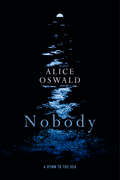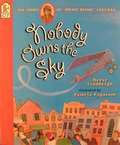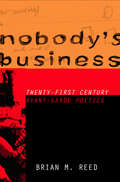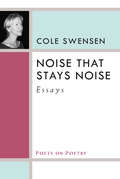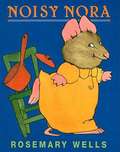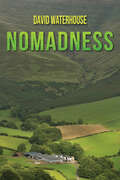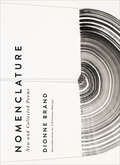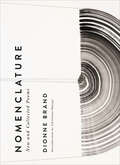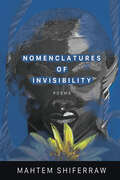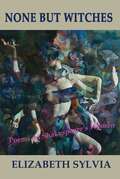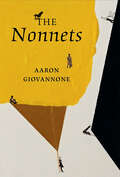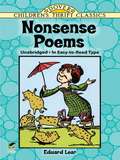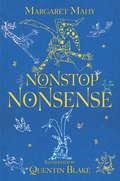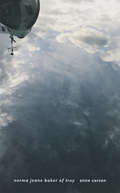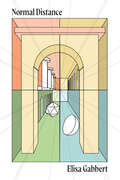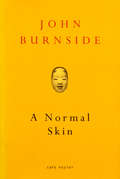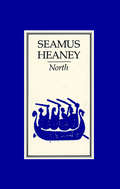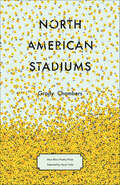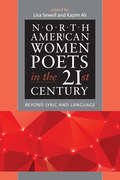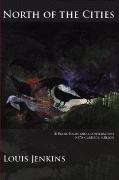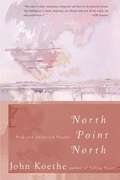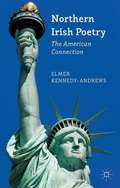- Table View
- List View
Nobody: A Rhapsody To Homer
by Alice OswaldA collage of water-stories from the Odyssey, reconstructed as a mesmeric and hallucinatory book- length poem by acclaimed poet Alice Oswald. In Memorial, her unforgettable transformation of the Iliad, Alice Oswald breathed new life into myth. In Nobody, she returns to Homer, this time fixing her gaze on a minor character in the Odyssey—a poet abandoned on a stony island—and the sea that surrounds him. Several voices drift in and out of the poem; though there are no proper names, we recognize familiar characters and the presiding spirit of Proteus, the shape-shifting sea-god. Reading Nobody is like watching the ocean; we slip our earthly moorings and follow the circling shoal of sea voices into a mesh of sound and light and water—fluid, abstract, and moving with the wash of waves. one person has the character of dust another has an arrow for a soul but their stories all end somewhere in the sea
Nobody Owns the Sky
by Reeve LindberghAs a young black woman in the 1920s, Bessie Coleman's chances of becoming a pilot were slim. But she never let her dream die and became the first licensed African-American aviator.
Nobody’s Business: Twenty-First Century Avant-Garde Poetics
by Brian M. ReedSince the turn of the new millennium English-language verse has entered a new historical phase, but explanations vary as to what has actually happened and why. What might constitute a viable avant-garde poetics in the aftermath of such momentous developments as 9/11, globalization, and the financial crisis? Much of this discussion has taken place in ephemeral venues such as blogs, e-zines, public lectures, and conferences. Nobody's Business is the first book to treat the emergence of Flarf and Conceptual Poetry in a serious way. In his engaging account, Brian M. Reed argues that these movements must be understood in relation to the proliferation of digital communications technologies and their integration into the corporate workplace.Writers such as Andrea Brady, Craig Dworkin, Kenneth Goldsmith, Danny Snelson, and Rachel Zolf specifically target for criticism the institutions, skill sets, and values that make possible the smooth functioning of a postindustrial, globalized economy. Authorship comes in for particular scrutiny: how does writing a poem differ in any meaningful way from other forms of "content providing"? While often adept at using new technologies, these writers nonetheless choose to explore anachronism, ineptitude, and error as aesthetic and political strategies. The results can appear derivative, tedious, or vulgar; they can also be stirring, compelling, and even sublime. As Reed sees it, this new generation of writers is carrying on the Duchampian practice of generating antiart that both challenges prevalent definitions or art and calls into question the legitimacy of the institutions that define it.
Noise That Stays Noise: Essays
by Cole SwensenPraise for Cole Swensen: "One of the most assured voices in contemporary poetry. " ---Library Journal "Engaging and delightful. " ---Publishers Weekly A volume in the Poets on Poetry series, which collects critical works by contemporary poets, gathering together the articles, interviews, and book reviews by which they have articulated the poetics of a new generation. Ezra Pound famously said that literature is "news that stays news," but recent experiments in poetry and the sciences allow us to enlarge the statement to bring information theory and biology to bear on the issue---in particular, how the information theory–based model of self-organization from noise offers a way to look at language as an art material as well as a mode of communication. This concept directs these essays on poetry by contemporary poet Cole Swensen. Noise That Stays Noisecovers a variety of subjects relevant to contemporary poetry and will give the general reader a broad notion of the issues that inform discourse around poetry today. Space---the conceptual geometry of poetry and its concrete mise-en-page---is an underlying theme of this collection, sometimes approached directly through the work of other twentieth-century poets, sometimes more obliquely through considerations of the role of the visual arts in contemporary poetry. This question of space and the shapes it includes and acquires offers a different way to look at some familiar writers, such as Mallarmé and Olson, and a way to introduce several more recent writers who may not yet be known to the general public.
Noisy Nora
by Rosemary WellsIt's tough being the middle mouse. Nora's baby brother and older sister require a lot of attention, and Nora always has to wait. Slamming doors, banging furniture, and even flying a kite on the staircase get no results. It isn't until Nora crashes out the door, and the house goes strangely silent, that her family realizes: a noisy Nora is much better than no Nora at all!
Nomadness
by David WaterhouseAlways visions of other lands haunt my ravaged mind and the ghosts of old lovers swirl in the fog of my brain. Habits and routine are my captors, the jailers that speak to me of bounds, fences and walls, yet my soul flies on the wild wind, searching for a home. I long to burn across new terrain like a meteor crashing through the dull and nebulous layers of this tired earths’ atmosphere. When shall I walk among the foothills of the Old Gods and feel new breezes blow through this shattered mind? To set the senses reeling and lose myself in the swirling fog of new emotion. Everything is growing, bursting out of itself like an explosion and creatures mass and swarm at some silent command. Is this the hand of God stirring his pot of wonders? And then the storms and the wild winds, the constant rains although warm- still crazy and without reason. All of nature here spinning and weaving, screaming in the minds of men. Here is the torrent, the onrush of life, the lesson to be learned, easily given and so readily taken up by poets and dreamers. Wild living, careless exaggeration, wonders of creation, the Psalms of the fields and forests. Listen then, listen to the songs and hear their frantic message, for there is a force greater than any man can know that is flowing faster than an avalanche. Eye and limb, branch and spore- nature has gone mad and man is afraid because the spirits of old lives are whistling in the wind.
Nomenclature: New and Collected Poems
by Dionne BrandSpanning almost four decades, Dionne Brand’s poetry has given rise to whole new grammars and vocabularies. With a profound alertness that is attuned to this world and open to some other, possibly future, time and place, Brand’s ongoing labors of witness and imagination speak directly to where and how we live and reach beyond those worlds, their enclosures, and their violences.Nomenclature: New and Collected Poems begins with a new long poem, the titular Nomenclature for the Time Being, in which Dionne Brand’s diaspora consciousness dismantles our quotidian disasters. In addition to this searing new work, Nomenclature collects eight volumes of Brand’s poetry published between 1982 and 2010 and includes a critical introduction by the literary scholar and theorist Christina Sharpe.Nomenclature: New and Collected Poems features the searching and centering cantos of Primitive Offensive; the sharp musical conversations of Winter Epigrams and Epigrams to Ernesto Cardenal in Defense of Claudia; and the documentary losses of revolutions in Chronicles of the Hostile Sun, in which “The street was empty/with all of us standing there.” No Language Is Neutral reads language, coloniality, and sexuality as a nexus. Land to Light On writes intimacies and disaffections with nation, while in thirsty a cold-eyed flâneur surveys the workings of the city. In Inventory, written during the Gulf Wars, the poet is “the wars’ last and late night witness,” her job is not to soothe but to “revise and revise this bristling list/hourly.” Ossuaries’ futurist speaker rounds out the collection and threads multiple temporal worlds—past, present, and future.This masterwork displays Dionne Brand’s ongoing body of thought—trenchant, lyrical, absonant, discordant, and meaning-making. Nomenclature: New and Collected Poems is classic and living, a record of one of the great writers of our age.
Nomenclature: New and Collected Poems
by Dionne BrandAn immense achievement, comprising a decades-long career—new and collected poetry from one of Canada&’s most honoured and significant poets.Spanning almost four decades, Dionne Brand&’s poetry has given rise to whole new grammars and vocabularies. With a profound alertness that is attuned to this world and open to some other, possibly future, time and place, Brand&’s ongoing labours of witness and imagination speak directly to where and how we live and reach beyond those worlds, their enclosures, and their violences. Nomenclature: New and Collected Poems begins with a new long poem, the titular "Nomenclature for the Time Being," in which Dionne Brand&’s diaspora consciousness dismantles our quotidian disasters. In addition to this searing new work, Nomenclature collects eight volumes of Brand&’s poetry published between 1982 and 2010 and includes a critical introduction by the literary scholar and theorist Christina Sharpe. Nomenclature: New and Collected Poems, features the searching and centering cantos of Primitive Offensive; the sharp musical conversations of Winter Epigrams and Epigrams to Ernesto Cardenal in Defense of Claudia; the documentary losses of revolutions in Chronicles of the Hostile Sun, in which &“The street was empty/with all of us standing there.&” No Language Is Neutral reads language, coloniality, and sexuality as a nexus. Land to Light On writes intimacies and disaffections with nation, while in thirsty a cold-eyed flâneur surveys the workings of the city. In Inventory, written during the Gulf Wars, the poet is &“the wars&’ last and late night witness,&” her job not to soothe but to &“revise and revise this bristling list/hourly.&” Ossuaries&’ futurist speaker rounds out the collection, and threads multiple temporal worlds—past, present, and future. This masterwork displays Dionne Brand&’s ongoing body of thought—trenchant, lyrical, absonant, discordant, and meaning-making. Nomenclature: New and Collected Poems is classic and living, a record of one of the great writers of our age.
Nomenclatures of Invisibility (American Poets Continuum Series #200)
by Mahtem ShiferrawThrough a lens simultaneously historical and political, Mahtem Shiferraw attends to personal and collective experiences of migration, motherhood, and immigration’s complicated notions of home.In Nomenclatures of Invisibility, Shiferraw calls us to carve out space for the multitudes of selves we carry when we migrate across boundaries of body, language, and state. Through a decolonial poetics, giving name to everything in her path from the Italian colonization of Eritrea (and failure to colonize Ethiopia) to her beloved eucalyptus tree, she blurs physical and temporal borders, paying homage to ancestors past, present, and future. Shiferraw writes unapologetically against erasure, against invisibility, instead creating a space that holds grief lovingly, that can tend to the wounds held and held in the endlessly-traveling body. Brilliant with abundance and texture, Shiferraw’s poems dismantle the empire's sterility of language, both historical and present. In Nomenclatures of Invisibility, Mahtem Shiferraw builds a home within her poems, attentively naming those who exist within them out of invisibility and into the radiant light: “We walk in unison too: our backs bending at once,/ our arms breaking, our abdomens kicked into silence, thighs bleeding. Through this I ask; am I still lit? And they, again…what else would you be—”
None But Witches: Poems on Shakespeare's Women
by Elizabeth SylviaAccording to the author, Shakespeare was unable to create fully realized female characters. "It doesn't matter, finally, if they are witty or can solve a vexing problem," she writes in her introductory poem. "All they do is orbit, casting here and there reflected light...." In this collection she gives new voices to Shakespeare's queens, daughters, lovers, and witches.
The Nonnets
by Aaron GiovannoneCompulsively confessional and cracking-wise, The Nonnets is an utterly unique alchemy of poetry and comedy.Aaron Giovanonne's latest collection is a book-length sequence of 'nonnets'--nine-line poems that Giovannone handles with ruthless dexterity. Capturing transformations from first dates to goodbye texts, from mama's boy to unrepentant shoplifter, from post-industrial downtown to eleventh-century Italian monastery, these poems present a kaleidoscopic world that careens wildly between despair and ecstasy.
Nonsense Poems: Nonsense Poems (Dover Children's Thrift Classics)
by Edward LearOver 90 delightful limericks and 12 longer poems, including such classics as "The Owl and the Pussy-cat," "The Jumblies," "Calico Pie," "The Duck and the Kangaroo," "Incidents in the Life of My Uncle Arly," "Mr. and Mrs. Spikky Spider" and more, all accompanied by Lear's amusing illustrations.
Nonstop Nonsense
by Margaret MahyA joyful jumble of poems, songs and stories.A full colour paperback edition of this wonderfully witty and delightfully silly collection of stories and rhyming nonsense from all-star author and artist team, Margaret Mahy and Quentin Blake.Poems, prose and rhymes from bestselling author Margaret Mahy, and beautifully illustrated by inaugural Children's Laureate, Quentin Blake, this edition of NONSTOP NONSENSE is a perfect gift that children and adults will enjoy again and again.
Nonstop Nonsense
by Margaret MahyA joyful jumble of poems, songs and stories.A full colour paperback edition of this wonderfully witty and delightfully silly collection of stories and rhyming nonsense from all-star author and artist team, Margaret Mahy and Quentin Blake.Poems, prose and rhymes from bestselling author Margaret Mahy, and beautifully illustrated by inaugural Children's Laureate, Quentin Blake, this edition of NONSTOP NONSENSE is a perfect gift that children and adults will enjoy again and again.
Nora: The Real Life of Molly Bloom
by Brenda MaddoxHow the wife James Joyce lived with and later married conditioned his poetry.
Norma Jeane Baker of Troy (Oberon Modern Plays Ser.)
by Anne CarsonAnne Carson’s new work that reconsiders the stories of two iconic women—Marilyn Monroe and Helen of Troy—from their point of view Norma Jeane Baker of Troy is a meditation on the destabilizing and destructive power of beauty, drawing together Helen of Troy and Marilyn Monroe, twin avatars of female fascination separated by millennia but united in mythopoeic force. Norma Jeane Baker was staged in the spring of 2019 at The Shed’s Griffin Theater in New York, starring actor Ben Whishaw and soprano Renée Fleming and directed by Katie Mitchell.
Normal Distance
by Elisa GabbertA collection of funny and thought-provoking poems inspired by surprising facts that will appeal to poetry lovers and poetry haters alike, from the author of the essay collection The Unreality of Memory, &“a work of sheer brilliance, beauty, and bravery&” (Andrew Sean Greer) Known to be both &“casually brilliant&” (Sandra Newman) and a &“ruthless self-examiner&” (Sarah Manguso), acclaimed writer Elisa Gabbert brings her &“questing, restless intelligence&” (Kirkus Reviews) to a new collection of poetry. By turns funny and chilling, these poems collect strange facts, interrogate language, and ask unanswerable questions that offer the pleasure of discovery on nearly every page: How does one suffer &“gladly,&” exactly? How bored are dogs? Which is more frightening, nothing or empty space? Was Wittgenstein sexy? The poems in this collection are earwormy, ultracontemporary, essayistic, aphoristic, and philosophical—invitations to eavesdrop on a mind paying attention to itself. Normal Distance is a book about thinking and feeling, meaning and experience, trees and the weather, and the boredom and pain of living through time.
A Normal Skin
by John BurnsideFrom memories of childhood and personal loss to the quiet celebration of a lover's navigational skills, from meditations on nature and sexuality to the fantasy world of aquarium fish, the poems in A NORMAL SKIN cover a wide range: lyrical in tone, and highly visual, they express once again the poet's sense of wonder at the world, while exploring some new preoccupations, including love and identity the tension between masking and self-revelation, and the writer's pleasure at returning to Scotland after a long absense. Most significant, however, is the continuing exploration of the relationship between self and other, and of the constant shifting of territory and boundaries, seen through the prism of love and home.
North
by Seamus HeaneyWith this collection, first published in 1975, Heaney located a myth which allowed him to articulate a vision of Ireland--its people, history, and landscape--and which gave his poems direction, cohesion, and cumulative power. In North, the Irish experience is refracted through images drawn from different parts of the Northern European experience, and the idea of the north allows the poet to contemplate the violence on his home ground in relation to memories of the Scandinavian and English invasions which have marked Irish history so indelibly.
North American Stadiums
by Grady ChambersWinner of the inaugural Max Ritvo Poetry Prize, North American Stadiums is an assured debut collection about grace—the places we search for it, and the disjunction between what we seek and where we arrive.&“You were supposed to find God here / the signs said.&” In these poems, hinterlands demand our close attention; overlooked places of industry become sites for pilgrimage; and history large and small—of a city, of a family, of a shirt—is unearthed. Here is a factory emptying for the day, a snowy road just past border patrol, a baseball game at dusk. Mile signs point us toward Pittsburgh, Syracuse, Salt Lake City, Chicago. And god is not the God expected, but the still moment amid movement: a field &“lit like the heart / of the night,&” black stars stitched to the yellow sweatshirts of men in a crowd.A map &“bleached / pale by time and weather,&” North American Stadiums is a collection at once resolutely unsentimental yet deeply tender, illuminating the historical forces that shape the places we inhabit and how those places, in turn, shape us.
North American Women Poets in the 21st Century: Beyond Lyric and Language (American Poets in the 21st Century)
by Lisa Sewell Kazim AliNorth American Women Poets in the 21st Century: Beyond Lyric and Language is an important new addition to the American Poets in the 21st Century series. Like the earlier anthologies, this volume includes generous selections of poetry by some of the best poets of our time as well as illuminating poetics statements and incisive essays on their work. Among the insightful pieces included in this volume are essays by Catherine Cucinella on Marilyn Chin, Meg Tyler on Fanny Howe, Elline Lipkin on Alice Notley, Kamran Javadizadeh on Claudia Rankine, and many more. A companion web site will present audio of each poet's work.Calling, Natasha TretheweyMexico 1969 Why not make a fictionof the mind's fictions? I want to sayit begins like this: the tripa pilgrimage, my mother kneeling at the altar of the Black Virgin, enthralled—light streaming in a window, the sun at her back, holy water in a bowl she must have touched. What's left is palimpsest—one memory bleeding into another, overwriting it. How else to explainwhat remains? The sound of water in a basin I know is white,the sun behind her, light streaming in, her face—as if she were already dead—blurred as it will become. I want to imagine her beforethe altar, rising to meet us, my father lifting metoward her outstretched arms. What else to makeof the mind's slick confabulations? What comes backis the sun's dazzle on a pool's surface, light filtered through waterclosing over my head, my mother—her body between me and the high sun, a corona of light around her face. Why not call it a vision? What I know is this: I was drowning and saw a dark Madonna; someone pulled me through the water's bright ceiling and I rose, initiate, from one life into another.
North of the Cities
by Louis JenkinsProse poems from the Minnesota-based poet, along with a brief interview with Garrison Keillor.
North Point North
by John KoetheNorth Point North: New and Selected Poems showcases the work of an important contemporary American poet, winner of the prestigious Kingsley-Tufts Award for Poetry. The volume opens with twenty-one new poems, some of which have appeared in The New Yorker, American Poetry Review, the New Republic, the Paris Review, and the Kenyon Review, among other periodicals, and in The Best American Poems 2001, edited by Robert Hass and David Lehman. Following are selections from Koethe's five earlier collections of poems: Blue Vents, Domes, The Late Wisconsin Spring, The Constructor, and Falling Water. Together these poems create a remarkable and powerful new volume, a milestone in this gifted poet's career.
Northern Irish Poetry
by Elmer Kennedy-AndrewsThrough discussion of the ways in which major Northern Irish poets (such as John Hewitt, Seamus Heaney, Michael Longley, Louis MacNeice and Derek Mahon) have been influenced by America, this study shows how Northern Irish poetry overspills national borders, complicating and enriching itself through cross-cultural interaction and hybridity.
